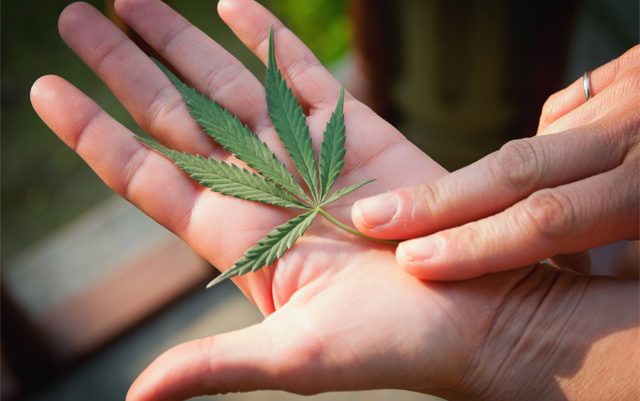Like it or not, the White House’s recent criticism and skepticism of recreational marijuana – and their affirmation of medical marijuana – is in-step with other Republicans.
The problem is – Republicans and people over 65 are out of step with most Americans when it comes to legalized cannabis, according to a recent Quinnipiac poll on the issue.
The controversial comments by White House Press Secretary Sean Spicer came at a press briefing to reporters last week. Cannabis policy experts, businesses, and advocates are outraged over the Trump spokesperson’s comments because they were loaded with misunderstandings – misunderstandings of current cannabis law, the gateway theory, and America’s newfound support for the plant.
“There’s a big difference between that [medical marijuana] and recreational marijuana,” said Spicer from the podium last week. “And when you see something like the opioid addiction crisis blossoming in so many states around this country, the last thing we want to be doing is encouraging people – there is still a federal law that we need to abide by when it comes to medical – in terms of recreational marijuana and other drugs of that nature. There’s a big difference between medical marijuana which states – in the states where that’s allowed in accordance with the appropriations rider have set forth a process to administer and regulate that usage versus recreational marijuana and that’s a very, very different subject.”
The Quinnipiac poll shows a majority of Americans approve of medical marijuana too, but the White House’s negative view of recreational marijuana remains out of step with most Americans, according to poll data.
Results show that more than half – 61 percent – of Republicans and about half of voters over the age of 65 are opposed to legalized marijuana. On the other hand, 59 percent of everyone polled – that means every other party, gender, education, age, and racial group listed – believes that marijuana use should be made legal in the U.S.
On the medical side, the study finds that a whopping 93 percent of voters support legalized marijuana for medical purposes if prescribed by a doctor, and the White House agrees.
Spicer said, “The president understands the pain and suffering that many people go through who are facing, especially terminal diseases, and the comfort that some of these drugs, including medical marijuana, can bring to them…”
Right now, cannabis is legal for recreational use in Alaska, seven other states and the District of Columbia.
Cannabis Caucus on The Hill
This year, a bipartisan group of congressmen in D.C. formed the new Cannabis Caucus. In response to the statement from the White House spokesman about potentially increasing federal prosecution of recreational marijuana smokers, they said they would step up efforts to educate the Trump administration on the issue.
In their joint statement, they wrote that they hope to “educate this administration on the need for more sensible marijuana policies and share the many experiences states have had with the legalization of cannabis. Together, we will continue to work in a bipartisan manner to reform our failed marijuana policies and provide a voice for Americans who have overwhelmingly voted for a more sensible drug policy.”
The new House Cannabis Caucus was recently launched by Reps. Earl Blumenauer (D-Oregon), Dana Rohrabacher (R-California), Jared Polis (D-Colorado), and Don Young (R-Alaska).
Industry reactions
The National Cannabis Industry Association (NCIA) represents over a thousand members of the cannabis industry. NCIA Executive Director Aaron Smith said in a statement, “It would be a mistake for the Department of Justice to overthrow the will of the voters and state governments who have created carefully regulated adult-use marijuana programs. It would represent a rejection of the values of economic growth, limited government, and respect for federalism that Republicans claim to embrace.”
Smith adds, “These programs are working. Marijuana interdictions at the Mexican border are down substantially, youth use has not increased in states with legal access to cannabis, and responsible cannabis businesses are contributing tens of thousands of jobs and hundreds of millions of dollars in economic impact to their communities.”
His statement also serves as a reminder to Trump that the industry is holding him accountable to what he’s said in the past – that he believes in marijuana policy, and that it should be left to the states.
This spring, NCIA will host its seventh Lobby Days, where cannabis businesses fly to Washington, D.C. to talk to state lawmakers about evening the playing field for cannabusinesses when it comes to taxes, banking, and of course, ending the federal prohibition of the plant. This is sure to be a hot topic for their efforts in 2017.
White House wrongly links cannabis to opioid crisis
Smith also notes that Spicer incorrectly calls cannabis a “gateway drug”, a myth that’s been debunked time and time again.
“It was especially disappointing to hear Press Secretary Spicer refer to the opioid crisis in relation to marijuana,” he writes. “Science has discredited the idea that marijuana serves as any kind of gateway drug, and the addiction and death rates associated with opioids simply do not occur in any way with cannabis. In fact, scientific research increasingly shows that access to cannabis significantly decreases rates of opioid addiction and death.”
Another policy expert, John Hudak, is a fellow at The Brookings Institute. Hudak immediately published an article breaking down Spicer’s comments and how they relate to enacted policies.
“Mr. Spicer should ask himself if he really believes heroin is as big a threat to Americans as a state-legal and regulated marijuana system. If he believes that answer is ‘yes’, then his equating the two is logical. If he believes the answer is ‘no’, he should abandon dangerous rhetoric that simultaneously hyperbolizes marijuana and de-legitimizes the opioid crisis. Moreover, Mr. Spicer should read some of the research that suggests marijuana could be used as a substitute for opioids, helping opioid users distance themselves from that drug. That research isn’t a rumor in the marijuana industry; it is medical research coming from the University of Colorado, the University of Michigan, and elsewhere.”
A BUD Summit to come?
Cannabis has gained so much traction in the past decade, there’s ample, legitimate groups of experts that the White House could meet. From Spicer’s comments at the briefing, it’s clear to many that the White House remains behind the times when it comes to all the new research and policies that have been fought for by patients, activists, businesses, and lawmakers.
From the NCIA, and the advocates at NORML, to the newly formed Cannabis Caucus – there’s thousands of professionals interested in fighting for cannabis, and the Trump administration could decide to meet with them, as they have with other job sectors, to learn more about the issue.
A call to action
Prior to this most recent White House cannabis kerfuffle, Americans for Safe Access (ASA) put out a call for advocates to come to D.C. for their National Medical Cannabis Unity Conference. The conference aims to help attendees learn about the latest in the industry and how to help “change hearts and minds about how medical cannabis is safe and essential to the health of countless patients.”
ASA is the largest national member-based organization of patients, medical professionals, scientists and concerned citizens promoting safe and legal access to cannabis for therapeutic use and research. Their call to action was based on the good news that the DEA finally removed factually incorrect information about cannabis from its website, claiming that it was a gateway drug, caused irreversible cognitive decline in adults, and contributed to psychosis and lung cancer.
Their message, “we need your support to help educate Jeff Sessions and other decision makers about why medical cannabis is just that – medicine.” These most recent comments by Spicer reveal that, indeed, it’s more than just Sessions that needs an update on where cannabis science stands.







Spicer’s bi-polaristic view of a Big Difference between “medical” and “recreational” cannabis use overlooks other issues: inspirational, educational and occupational uses.
It’s clear that in their defense of medical use, but misguided condemnation of adult recreational, that there is pharma industry rent seeking afoot.